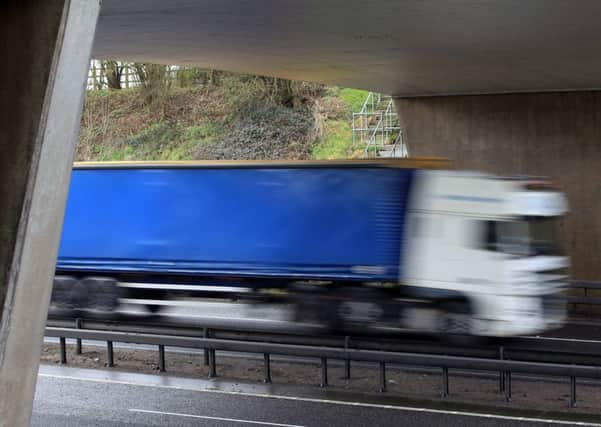Martin Reid: Let’s take road to swifter payment


Last month, Keith Brown, the minister for transport and veterans, announced that PBAs will be used as the payment mechanism for the Inveramsay Bridge improvement project on the A96.
Although this news is not necessarily welcomed by some of the tier-one contractors, it is almost universally welcomed by those of us who represent sole traders, micro businesses and SMEs. For many years, the Road Haulage Association has campaigned for the payment of invoices in a reasonable period, and the Scottish Government’s decision to use a PBA as the payment mechanism for a fairly major infrastructure project will hopefully go some way to realising that goal.
Advertisement
Hide AdAdvertisement
Hide AdIn January this year, the CBI, in response to a government consultation on late payment entitled Building a Responsible Payment Culture, stated that the “national late payment debt stands at £30.2 billion and the average business is owed £31k in overdue payments”. Unfortunately, over the years, and particularly through the recession, late payment culture has become endemic. The European Commission has proposed a maximum payment delay of 60 days from invoice unless both sides agree to longer terms, freely and without market coercion. Sadly, and as many of our members know, 60-day payment terms are by no means out of the ordinary, with many looking to 90 days and, in some notable cases, beyond.
Any late or slow payment becomes half of a “double whammy” for many haulage firms. For them, the biggest single cost they have is diesel, which in most cases has to be paid for within two weeks, often before the haulage service is delivered, so if they are outlaying money and then not getting it back timeously then they are squeezed at both ends. The knock-on effect is that the haulier loses working capital, which makes it more difficult to access funding from banks that are already very reticent to lend to businesses anyway. So, in some cases, sub-contractors such as our RHA members were providing the working capital for projects and also taking a disproportionate amount of the risk. The upshot is, at the height of the recession and across industry, ten sub-contractors were failing every day, and of them nearly 50 per cent were down to late payment.
I am not an accountant or a banker and so I am happy to leave the minutiae of how PBAs work to them, but in layman’s terms, the PBA is a ring-fenced account where the client can automatically trigger payments to the main contractor and tier-one, tier-two and tier-three contractors simultaneously.
This method of prompt payment allows cash to flow through the supply chain, reducing the risk for sub-contractors. The PBA has trust status and so the supply chain members are named in the account as beneficiaries. As Keith Brown MSP stated: “Project Bank Accounts have the potential to make the difference between sub-contractors of any size becoming insolvent or staying afloat, help preserve capability, competitiveness … and help build greater resilience into the broader Scottish economy.”
It has to be said that PBAs are not something new. Defence Estates have been using PBAs for a couple of years now and in January 2013, Northern Ireland mandated the use of PBAs on all government contracts over £1 million. There are tried and tested models to work on so this is not necessarily a leap into the unknown.
While we welcome the Scottish Government’s trail of PBAs, we also must accept that they are not a universal panacea that will cure all supply chain woes.
What is required is a cultural change where payment in a reasonable period is encouraged, especially in times of economic downturn. We at the RHA would ask the government to encourage greater dialogue between client, consultants, main contractor and supply chain before the outset of the project, to set payment expectations and foster these relationships. Real differences can be made through greater transparency and communication with the whole of the chain. We would also advocate the use of stronger penalties for late payment and would join many other trade associations and representative bodies in requesting the appointment of a “Procurement Ombudsman” to oversee procurement practice in Scotland.
The RHA would welcome the chance to discuss this further with the Deputy First Minister, but I guess that debate is for another day. Today, we very much welcome the PBA trial on the A96 and look forward to our hauliers and other sub-contractors enjoying earlier payment. Who knows, maybe one day we can raise a glass and toast the first public sector contract using a PBA.
• Martin Reid is director of the Road Haulage Association www.rha.uk.net